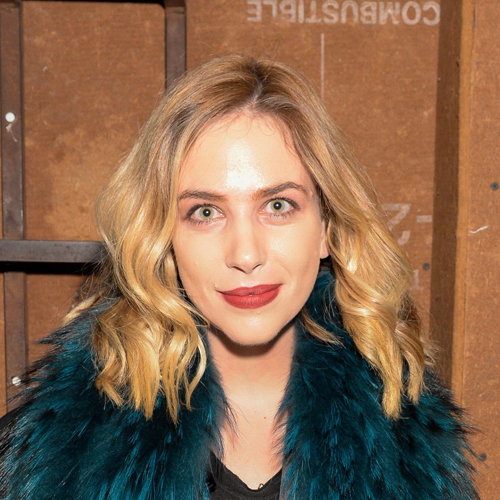If you spend as much time on the internet as we do, perhaps you've noticed that it's been a wild few days for personal essays. Are they making a post-xoJane comeback, you ask? Erm, well, probably not, if these two examples are the best the genre currently has to offer. First, there was the Washington Post writer incensed that Jewish guys kept breaking up with her. Timed to Passover, of course. Then yesterday, The Cut, New York Magazine's typically and increasingly excellent fashion and lifestyle vertical, published a confusing and cliché-ridden piece called "What It's Like to Go Through Life As a Really Beautiful Woman." Give it a read, because it's certainly...something.
In it, an anonymous woman in her late 50s tells writer Alexa Tsoulis-Reay of her difficult existence as an uncommonly beautiful woman. It's a tale of woe that's been told before in places ranging from Vice to, of course, the controversial personal essay factory known as Thought Catalog. And while it's certainly an interesting (not to mention clickable) topic, this particular narrative falls flat for a number of reasons, one of the biggest being that there are just so many holes. It's a story that assumes a baseline level of sympathy from its readers that it unfortunately fails to cultivate, instead dropping a string of random examples of interpersonal strife and exclusion that could be chalked up to many things, but that the writer and narrator assume we will all automatically agree is 100 percent due to the narrator's jaw-dropping looks. What it amounts to is the story of a sad, aging woman looking back on her life, seemingly anxious to assign her missteps up to something beyond her own control. Once my eyes stopped rolling, I did find that I felt for the narrator—not because I believe her looks have ruined her life, but because she seems to believe that they did. It's sad, but not, I don't think, in the way the article intended it to be. That doesn't stop me, however, from having some questions. Like, a whole lot of questions.
Has anyone in the history of employment actually "never interviewed for a job [they] didn't get?"
I just straight up don't buy this. And even if it's somehow true, I don't buy that it can be solely attributed to her looks. Even if she were a supermodel, she would have experienced rejection, because that's simply the kind of industry modeling is. It's predicated on rejection, which is why only very resilient people tend to make it. But the narrator says she worked across a variety of fields, including modeling and television (aka "pretty person jobs") and PR, writing, and reporting. While I buy that extraordinarily good looking people get preferential treatment in hiring for pretty person jobs (because duh), I've never heard of anyone hiring a reporter or a PR flack because they were super hot. Sure, having a certain aesthetic might snag you an interview, especially if you're on the fashion, beauty, or lifestyle beat, but at the end of the day, if you can't write or report or pitch stories or do whatever the essential function of the job is, you probably won't get very far. I mean, right? Or am I just missing out on a whole lot of big-time writing gigs because I'm not a model?
Is it really that common for adult women to "despise" other women because they're attractive?
Okay, so every traditionally attractive girl has a story about being bullied by other girls who were "jealous." It's real, especially in middle and high school and sometimes even college. But to go through your whole life being ostracized by pretty much every woman you encounter, including people like your sister-in-law? That seems... atypical, perhaps? In my experience, even if people are initially intimidated by someone, if that person can prove themselves to be friendly and down-to-earth, all can be reconciled. I mean, even supernaturally, freakishly good looking women like Emily Ratajkowski and Gigi Hadid have friends. Granted, a lot of them are other models, but I guess it's nice to know that when all else fails, beautiful people have other beautiful people to bond with?
Also, you know who else gets bullied and ostracized? Unattractive people! And normal looking people! Pretty much everyone has experienced this to one degree or another at some point in their lives. That's not to say bullying isn't traumatic or worth speaking out about, but it's narrow-minded think beautiful people somehow encounter that stuff more than others.
The women's conspicuous deflection of the possibility of her own culpability in her interpersonal breakdowns perpetuates the false stereotype that all women are jealous, appearance-obsessed vultures. While I'm sure some women—perhaps especially the "competitive, attractive, wealthy, entitled women" the narrator talks of—never move on from allowing the green-eyed monster to color their interpersonal interactions, most of us eventually realize we have more important shit to worry about than whether some other person happens to be prettier than we are.
Speaking of which, what's the real deal with this whole sister-in-law anecdote?
The narrator really glosses over two stories involving sisters-in-law—one of which involves her current sister-in-law blocking her on Facebook and never inviting her on family vacations. Maybe there's more to the story than just that event occurring, no? Like, nobody just blocks someone on Facebook because they're very pretty. In my experience, you've either done some really dark stuff or you're just posting way too much about politics. But hey, maybe not. Maybe this woman's sister-in-law really does hate her because she's too beautiful. But before I join her in that conclusion, I'll need some more info. Can we get the sister-in-law to do some kind of rebuttal here?
How does this lady's husband feel about her admitting in a public forum that she only married him because she wanted a kid and by the time she was done riding "the marry-go-round", all the good ones were taken?
Granted, this piece is anonymous, but you've got to imagine he knows about it, right? And reading the following passage wouldn't make me feel excellent: "There was a time when things were bad and I considered leaving him but I had no idea how to even go about finding someone new because I never, ever, had to pursue a man. I knew I couldn’t cope with that kind of rejection." Ouch?
Why is being "invisible" such a bad thing?
While many middle-aged women have complained of feeling invisible, I fail to see why this is a negative. First of all, I'm assuming that due to her extreme beauty, this particular woman was often catcalled and street harassed in her youth. Wouldn't being able to go about your day without this—behavior that, contrary to popular male belief, is not considered by most women to be flattering or enjoyable—be refreshing?
"These days, since I have aged, when I don’t wear makeup and I gain a bit of weight (which happens often) I pass as normal. As far as men, and anyone under 40 is concerned, I am invisible. They do not see me. I could walk across the street naked — it’s that bad," the narrator gripes.
I can understand not wanting to feel invisible to the people you care about—your partner, your family, your friends. But it doesn't sound like that's what she's really lamenting. It sounds like she's genuinely incensed that men under 40 are no longer crossing the street to sexually harass her, and I am confused by this.
Has she really lost all her value?
Listen, all snark aside, this woman is speaking her truth. I don't buy much of it, but it's certainly hers to speak. That said, perhaps the most disturbing part of the article is her assertion in the last paragraph that, while she's grown considerably as a person in her advanced age—a good thing, since it sounds like she had some growing to do), nobody cares because she's "lost all [her] value." Is this a thing? I refuse to believe this "rotting fruit" theory.






